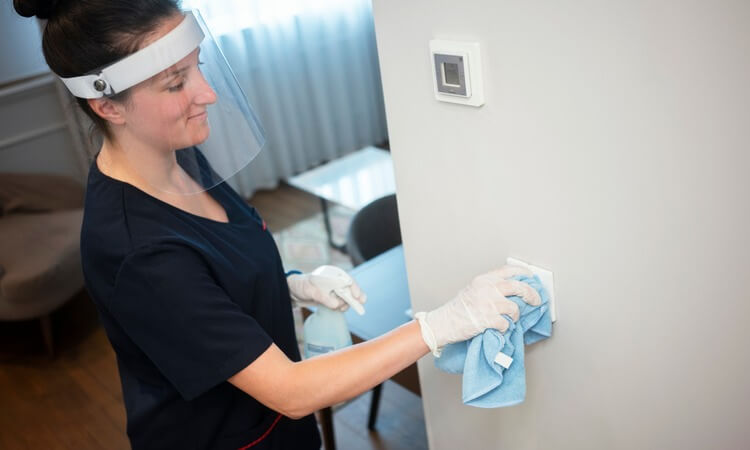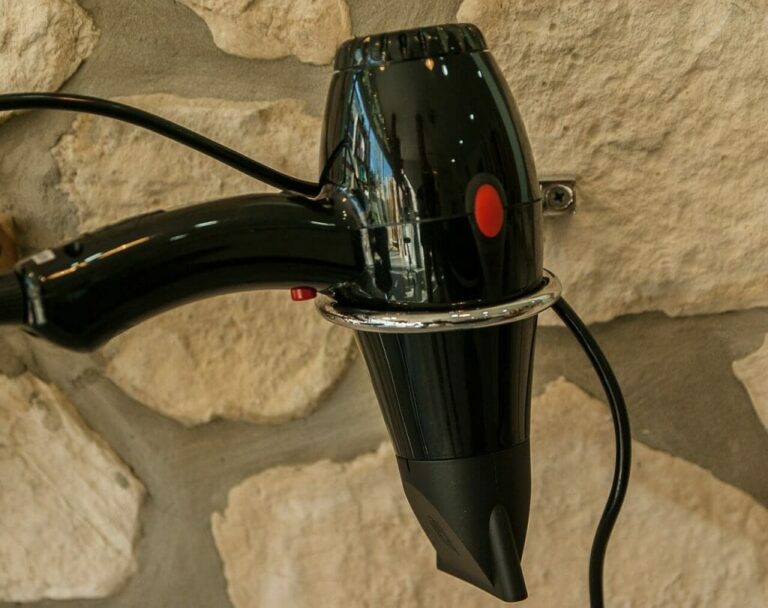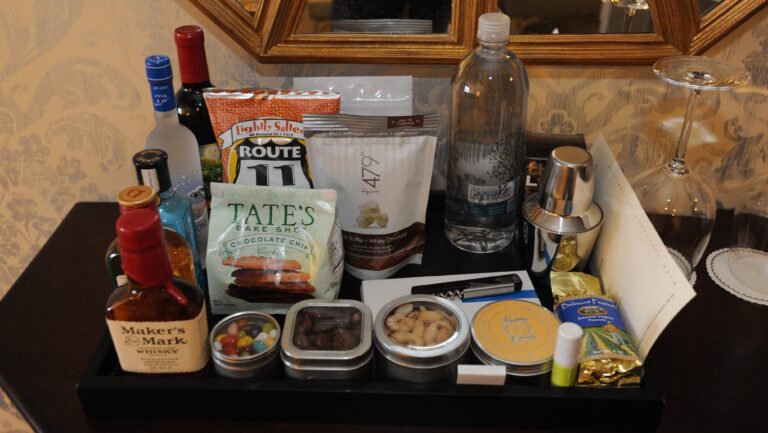Can You Get Scabies from a Hotel

Yes, you can get scabies from a hotel due to the high turnover of guests and shared bedding, towels, and furniture. Scabies is a highly contagious skin condition caused by tiny mites that burrow into the skin to lay eggs.
It is easily transmitted through close contact with an infested person or by sharing personal items. While scabies is commonly associated with overcrowded and unclean living conditions, hotels can also be a source of infestation. The constant influx of guests and the use of shared facilities increase the risk of exposure.
We will explore the likelihood of contracting scabies from a hotel, the signs and symptoms, prevention measures, and treatment options available. By being aware of the risks and taking necessary precautions, you can help protect yourself against a scabies infestation during your hotel stay.
Navigate Where You Want:
- The Basics Of Scabies
- Scabies Transmission In Hotels
- Recognizing Scabies Symptoms
- Evaluating Hotel Hygiene Practices
- Risk Factors For Scabies In Hotels
- Personal Precautions For Scabies Prevention
- Hotel Preventions And Remediations
- Steps To Take If Infected With Scabies
- Hotel Response To Scabies Infestation
- Summarizing The Risk Of Scabies In Hotels
- Frequently Asked Questions Of Can You Get Scabies From A Hotel
- Can Scabies Spread From A Hotel Room?
- How Can I Prevent Scabies At Hotels?
- What Are The Symptoms Of Scabies?
- Conclusion
The Basics Of Scabies
Scabies is a contagious skin condition caused by tiny mites burrowing into the top layer of your skin. It can be contracted from direct skin-to-skin contact with an infected person, but can you get scabies from a hotel? While scabies is more commonly transmitted through prolonged close contact, it is possible to pick up the mites from bedding, towels, or furniture in a hotel room.
This is especially true if the room hasn’t been properly cleaned or if someone with scabies has recently stayed there. It’s important to know the common symptoms of scabies, which include intense itching, a rash, and small red bumps or blisters on the skin.
If you suspect you have encountered scabies, it’s recommended to seek medical attention for proper diagnosis and treatment. Understanding the basics of scabies can help protect yourself and prevent the spread of this bothersome condition.
Scabies Transmission In Hotels
Scabies transmission in hotels can be a concern for travelers. While scabies is primarily contracted through direct skin-to-skin contact, it is possible to acquire it from infested bedding or furniture in hotel rooms. Factors such as a high turnover of guests, crowded public spaces, and inadequate cleaning practices can contribute to the spread of scabies in hotels.
It is crucial for hotels to maintain cleanliness and implement proper hygiene protocols to prevent scabies infestations. Regular cleaning of bedding, disinfection of surfaces, and prompt treatment of infested rooms are important measures for controlling the transmission of scabies. By prioritizing cleanliness and taking necessary precautions, hotels can create a safe and comfortable environment for their guests, reducing the risk of scabies transmission.
Recognizing Scabies Symptoms
Scabies symptoms can be recognized by observing certain signs on yourself or others. These symptoms typically include intense itching, especially at night, and a pimple-like rash. The rash may appear as tiny blisters or raised bumps, often in the folds of the skin.
In some cases, atypical symptoms may indicate scabies, such as thin, pencil-like burrows or scaly patches on the skin. If you have shared bedding, towels, or clothing with someone who has scabies, or if you have stayed in a hotel where scabies may have been present, it is important to be aware of these symptoms.
Early identification and treatment can help prevent the spread of scabies.

Credit: www.hotelfandb.com
Evaluating Hotel Hygiene Practices
Evaluating hotel hygiene practices is crucial to prevent the spread of scabies. Regular assessments of hotel cleanliness are common practices. Look out for any red flags that may indicate poor hygiene standards.
Risk Factors For Scabies In Hotels
Scabies can potentially be contracted from hotels, especially in certain high-risk areas. Understanding how this skin condition spreads in hotel settings is crucial in preventing its transmission. Factors such as close contact with infested bedding, furniture, or towels, as well as crowded or poorly maintained accommodations, increase the likelihood of scabies in hotels.
Vigilance is needed when staying in hotels to minimize the risk of scabies transmission. Regularly washing and disinfecting personal items, avoiding direct contact with potentially contaminated surfaces, and practicing good hygiene can all help prevent the spread of scabies in hotel environments.
By being aware of these risk factors and taking necessary precautions, travelers can enjoy their stay without having to worry about scabies. It is essential to prioritize personal hygiene and cleanliness while staying in hotels to avoid any potential health risks.
Personal Precautions For Scabies Prevention
Scabies is a highly contagious skin condition that can be acquired in various places, including hotels. To prevent scabies, it is crucial to practice effective personal hygiene. This includes regular handwashing with soap and water, especially before and after touching potentially contaminated surfaces.
Additionally, avoid sharing personal items with others, such as towels, bedding, or clothing. When traveling, take precautions to minimize the risk of scabies. This can involve inspecting hotel rooms for cleanliness and checking for any signs of scabies, such as itching or rash.
It is advisable to bring your own bedding and use luggage racks to prevent contact with potentially infested surfaces. By following these recommendations, you can protect yourself from scabies and enjoy a worry-free stay in a hotel.
Hotel Preventions And Remediations
Hotels can implement various strategies to prevent scabies. By following proper cleaning and sanitization procedures, hotels can minimize the risk of scabies transmission. Thoroughly cleaning bedding, towels, and other items can eliminate any potential infestations. Hotel management also plays a significant role in reducing scabies transmission.
They should educate staff members about proper hygiene practices and provide training on identifying and addressing potential scabies cases. Regular inspections and prompt action in case of infestations are crucial. Additionally, hotels can collaborate with professionals to conduct regular pest control measures to prevent the spread of scabies.
By implementing these strategies, hotels can create a safe and hygienic environment for their guests, minimizing the risk of scabies transmission.
Steps To Take If Infected With Scabies
If you suspect that you have scabies from a hotel, it is important to take immediate action. The first step is to seek medical advice from a healthcare professional. They will be able to diagnose scabies and provide you with the appropriate treatment options.
It is crucial to follow their instructions closely in order to effectively eliminate the infestation. Additionally, you should take measures to prevent the spread of scabies to others. This includes washing all bedding, clothing, and towels in hot water, as well as vacuuming and disinfecting your living area.
It is also advisable to inform anyone you have been in close contact with about your condition so that they can take precautions as well. By taking these steps, you can effectively deal with scabies and prevent it from spreading further.
Hotel Response To Scabies Infestation
Scabies infestation in hotels can be a concerning issue that needs to be addressed promptly. Hotels have specific protocols in place to handle such outbreaks. Firstly, effective communication with guests is essential to inform them about the situation, the steps taken, and any precautions they should follow.
Hotels also collaborate with public health agencies to ensure proper assistance and guidance. The hotel staff undergoes thorough training on how to deal with scabies incidents to minimize the risk of transmission. Additionally, hotels take measures to restore customer confidence by implementing rigorous cleaning and disinfection procedures in affected areas.
Clear and transparent communication is key to address any concerns and regain trust. By following these protocols, hotels can effectively manage scabies outbreaks and maintain a safe environment for all guests.
Summarizing The Risk Of Scabies In Hotels
Scabies transmission risks in hotel settings can vary, highlighting the importance of awareness and prevention measures. Proper understanding of how scabies spreads among guests and within hotel premises is crucial. It is vital to remember that scabies is caused by mites that burrow into the skin, which are easily transferable through direct contact with an infected person or contaminated surfaces.
Hotels, with their high turnover of guests, increased human interaction, and shared spaces, present an ideal environment for scabies transmission. Regular cleaning and disinfection of hotel rooms, linens, and common areas can help minimize the risk. Furthermore, promoting awareness among staff and guests about the signs and symptoms of scabies can enable early detection and containment.
By adhering to these preventive measures, both hotels and guests can mitigate the spread of scabies and ensure a safe and enjoyable stay.
Frequently Asked Questions Of Can You Get Scabies From A Hotel
Can Scabies Spread From A Hotel Room?
Yes, scabies can spread from a hotel room if an infested person has stayed there recently. Scabies mites can survive on bedding, furniture, and other surfaces, allowing them to be transmitted to the next occupants. It’s important to wash and sanitize hotel linens and avoid direct contact with potentially infested items.
How Can I Prevent Scabies At Hotels?
To prevent scabies at hotels, avoid direct skin contact with bedding, towels, and furniture. Consider bringing your own pillow and a mattress protector. When returning home, immediately wash all clothes from the trip in hot water. Practicing good hygiene and vigilant inspection can also lower the risk of infestation.
What Are The Symptoms Of Scabies?
Common symptoms of scabies include intense itching, especially at night, and a rash that consists of small, red, raised bumps. The rash may appear on the wrists, between fingers, in armpits, or other warm areas. It’s important to seek medical diagnosis for proper treatment if you suspect scabies.
Conclusion
While the possibility of contracting scabies from a hotel exists, it is a relatively rare occurrence. By taking some simple precautions, such as avoiding direct contact with potentially infested bedding or furniture and practicing good hygiene, you can minimize the risk even further.
It’s also important to note that scabies mites cannot survive for long periods of time outside of their human host, making the chances of transmission even lower. Nonetheless, if you do develop symptoms of scabies after staying in a hotel, it is recommended to seek medical advice promptly.
Remember, being informed and vigilant about hygiene practices can go a long way in protecting yourself from potential infestations. So, next time you book a hotel stay, enjoy your trip with confidence, knowing that the risk of getting scabies is quite low if you follow these simple precautions.
Related Articles To Read:
- Can I Buy Doubletree Cookies at the Hotel?
- Can You Afterpay Hotels?
- Can You Bring Alcohol into a Hotel?
- Can You Bring Cockroaches Home from a Hotel?
- Can You Buy a Hotel Room?
- Can You Check Into a Hotel at 18?
- Can You Check Out of a Hotel Early?
- Are Emotional Support Animals Allowed in Hotels?
- Are Hotel Deposits Refundable?
- Are Hotel Rooms Soundproof?






